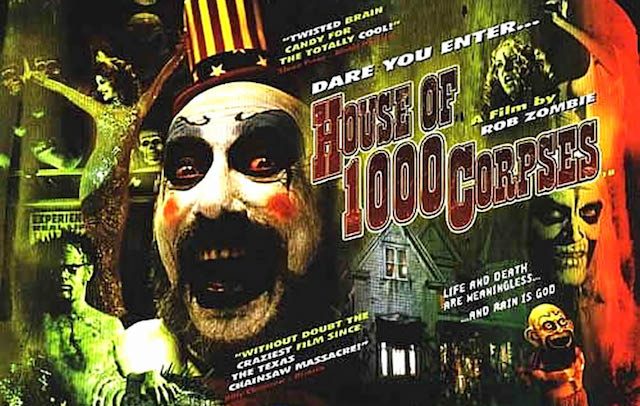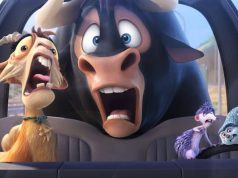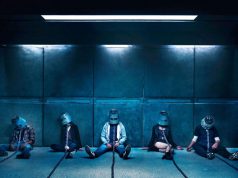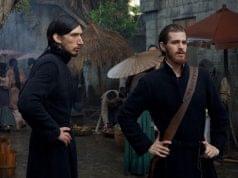
Rob Zombie had a hard time getting his directorial debut, “House of 1000 Corpses,” into theaters. It was only through perseverance, commitment, and a deal with the dark lord Satan that he finally succeeded in sharing his vision with the world. We’ve hardly been able to get rid of him ever since.
Man, did I ever hate this movie.
What I said then:
“A massively unpleasant film…. I have seen movies with more gore and carnage … but I don’t know that I’ve seen it done with more distastefulness than this. It is so crass that even fans of crassness may find it unenjoyable…. The teens are bitter and stupid and unworthy of sympathy; their captors are ugly, vile persons unworthy of being feared…. As with many first-timers, Zombie’s directorial style is over-done and amateurish. He randomly cuts to violent and/or sexual images every now and then, evidently just for shock value, and he permits some of the worst acting I’ve seen in a good long while…. When movies like these are fun, they are fun because they introduce clever or amusing ways of killing people, or because some level of wit is exhibited by the filmmaker. ‘House of 1000 Corpses’ has none of this…. This is a hateful, vicious piece of work that is best left ignored.” Grade: F [complete review]
The circumstances remind me of a movie I Re-Viewed a couple weeks ago, “Freddy Got Fingered,” which I also remembered as being a grotesquely unpleasant experience the first time. I saw “House of 1000 Corpses” on opening day, April 11, 2003, because it hadn’t been screened for critics beforehand (a practice that was much less common in 2003 than it is now). My friend Brett went with me, because we had this thing where we watched horror movies together, no matter how bad it seemed like they were going to be. We both found this one irredeemably repellent and stupid. (“Movie hates me,” I jotted in my notes.) I was able to work out some of my anger by writing a scathing review, but I don’t know what Brett did. Probably killed a hobo, if I know Brett.
Rob Zombie (real name: Robert Bartleh Cummings, and I’m not making that up) was a heavy-metal musician first, but his move to filmmaking wasn’t completely random. His band, White Zombie, was named after a 1932 Bela Lugosi movie, and Zombie had directed a few of his own music videos. It’s clear from watching “House of 1000 Corpses” that he was a big fan of the 1970s exploitation and horror films (including, of course “Halloween,” which he would eventually direct a remake of). A few of his cast members were veterans of such movies.
Nonetheless, it was Zombie’s previously established musical fanbase that gave “House of 1000 Corpses” its cult following. Instead of selling out when he became a filmmaker, Rob Zombie made exactly the kind of movie that Rob Zombie fans would go for. Fans of horror movies in general and exploitation cinema specifically, well, maybe not.
The re-viewing:
The first viewing, eight years ago, felt like a mindless assault on my senses. The second viewing, just recently, was far less unpleasant. There are probably several reasons for this, but I suspect it’s mainly because I’ve seen several movies of this nature in the meantime that were more repugnant and ugly than “House of 1000 Corpses” is — including its sequel, “The Devil’s Rejects” (2005).
I’m not sure how to feel about the realization that what was once among my most awful movie-watching experiences now doesn’t even make the top ten.
“House of 1000 Corpses” prefigured the torture-horror trend, coming out well before the “Saw” series, “Hostel,” and the others. When I saw it, I had only a passing familiarity with its gruesome predecessors (“The Hills Have Eyes,” “Last House on the Left,” “Texas Chainsaw Massacre,” etc.). I’d seen plenty of slasher movies, but the victims almost always die quickly in those. Torture was a relatively new and hideous notion for me, moviewise.
But it isn’t necessarily a deal-breaker. As I’ve seen more exploitation films, both old and new, on DVD, in theaters, and at festivals, I’ve become fascinated with them (in a completely wholesome manner, I promise). The way they’re structured, the narrative devices they use, their methods of pushing our buttons — all of that is endlessly intriguing to a person who likes to analyze things. Most of these movies are ugly and unpleasant, of course: that’s the point. But I’ve come to appreciate the difference between a movie that rattles your senses in a manner that is ultimately “enjoyable” and one that’s just off-putting and nasty.
There’s a fine line, though, and the line is different for everyone. Listen to the people coming out of a Fantastic Fest screening — who tend to be aficionados of extreme cinema — and you’ll hear opposite reactions to the same movie. What’s awesomely, grotesquely, violently entertaining to one person is merely revolting to another.
Which isn’t to say that I enjoyed “House of 1000 Corpses” on second viewing, only that it didn’t seem to be sitting on my head and punching me in the face the whole time. For I haven’t just seen movies that were more hateful since 2003 — I’ve also seen movies that did this sort of thing much, much better. I’ve seen exploitation films whose central premises have actual ideas behind them, where some wit and imagination are on display, movies that aren’t forced to rely on random cutaways of violence and naked girls for cheap shocks.
Zombie occasionally toys with giving his maniacs a demented motive for their violence, having them utter lines suggesting resentment toward outsiders, or defensiveness about being ignorant hillbillies, or fear of being mocked by city slickers. But the idea is never explored beyond a couple bits of dialogue. We get the sense that these lunatics torture and kill without motive, for no reason other than that they are pure evil. But I’ve seen that done better, too. I’ve seen pointlessly cruel movies where the pointless cruelty was scarier, more unsettling, more chilling.
Zombie has obviously seen the classics of the exploitation-horror genre. But I don’t think he understands what makes them work. Or perhaps he does understand and just wasn’t able to duplicate it himself. In any event, my overriding thought for much of this second viewing was something closer to pity: Aw, look! He’s trying to make something disturbing and creepy! How adorable!
Do I still hate this movie?
Yes, albeit with less fervent passion. It’s not aggressively awful; more like benignly awful, the kind of awful you can sit through without becoming enraged. So I guess that’s a step up? Grade: D
— Film.com




